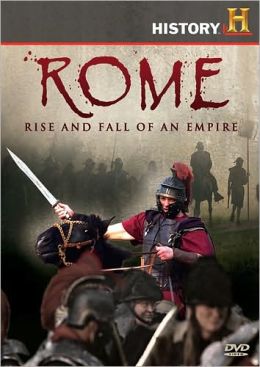
This
documentary about the rise and fall of the Roman Empire , which has been shown on the
History Channel, is available on a DVD. It is divided into thirteen episodes.
Each episode, which runs for about 45 minutes, covers one person and/or one
topic. Here is a brief overview:
1. “The
First Barbarian War.” Gajus Marius (born 157 BC, died 86 BC)
2.
“Spartacus.” The slave rebellion in Italy
3. “Julius
Caesar.” The military commander (born 100 BC, died 44 BC)
4. “The Forest of Death German Forest
5. “The Invasion of
6. “The
Dacian Wars.” Emperor Trajan (98-117)
7. “Rebellion and Betrayal.” Emperor Marcus Aurelius (161-180)
8. “Wrath
of the Gods.” Emperor Decius (249-251)
9. “The
Soldiers’ Emperor.” Emperor Aurelian (270-275)
10.
“Constantine the Great.” Emperor Constantine (306-337)
11. “The
Barbarian General.” Emperor Theodosius (379-395)
12. “The
Puppet Master.” Ricimer (born 405, died 472)
13. “The
Last Emperor.” Emperor Romulus Augustulus (476)
Many scenes
have been reconstructed with the help of modern actors, but they do not speak
to us. While we watch them, a narrator brings the story forward, step by step.
Sometimes he quotes an ancient source, for instance the historian Cassius Dio
or Tacitus, which gives the documentary added credibility.
Several
scholars have been interviewed for the documentary. We meet them from
time, always one at a time. They do not talk to each other, they talk to us. The
panel of experts changes gradually, from one episode to the next, depending on
the topic.
When we
meet the experts, the reconstructions with modern actors are (partially)
interrupted, which gives the documentary some variation.
This documentary
covers a lot of ground: many persons and many topics are presented. But the
problem is that the history of the Roman Empire is very long and cannot be covered in
a book of a few hundred pages or a documentary of a few hours. Several important
persons and topics are ignored, even though they are needed to give and to get
a full and fair picture of the rise and fall of the Roman Empire . Let me explain my concerns:
(a) How and
why was the Roman
Empire
established? This question is never addressed. We never hear anything about
“the rise” of the Roman Empire . The earliest date we hear is 113 BC (in episode # 1). At that time the
city of Rome
(b) The
documentary has a very narrow focus: military and political history. All other
aspects of Roman society – such as social or economic history, such as art and
architecture – are virtually ignored. Obviously, the Roman army is an important
factor in any account of the Roman world, but it is not the only relevant
factor.
(c) Episode
# 5, “The invasion of Britain Britain
(d) From
episode # 6 with Trajan and the Dacian wars the documentary jumps to Marcus
Aurelius. So Emperor Hadrian is ignored. In addition, the long and difficult
conflict between the Romans and the Jews is ignored:
** The first round – the uprising in
** The second round – the uprising in
** The third round – the uprising in
(e) In episode # 7 we are told that Marcus Aurelius appointed his son Commodus as his heir. The experts explain that this was only “natural” - but this is not true. Since Nerva (96-98) there had been a new system in which the ruling emperor did not appoint his son as his heir, but instead the most promising candidate. Nerva adopted Trajan, who adopted Hadrian, who adopted Antoninus Pius and Marcus Aurelius. The period of the adoptive emperors is considered “a golden era” by many modern observers. Marcus Aurelius himself had been adopted, so there was nothing “natural” about it when he appointed his son as his heir. Indeed, many modern observers feel that Commodus was a most unfortunate choice.
(f) From
episode # 7 with Marcus Aurelius the documentary jumps to Decius and the Gothic
wars. We never hear about Emperor Septimius Severus (the first Roman Emperor
who was born in Africa ) and his dynasty. In 212, during the rule of his son Caracalla, all
citizens of the empire were declared Roman citizens. This important event is
ignored.
(g) Why did
the Roman
Empire
fall? This question is (almost) never addressed (except for a few brief remarks
at the end of the last episode). We follow the history of the (western) empire
as it falls apart, step by step, but there is no systematic attempt to identify
the factors which played (or may have played) a role here, and consequently no
attempt to evaluate the importance and weight of each individual factor.
In my
opinion, the biggest problem with this documentary is not so much what the producers
have done, but what they have not done. The flaw is not so much an act of
commission, but an act of omission.
Because of
the narrow focus on military and political history, because of the omission of
important persons and topics, I cannot give it four or five stars. On the other
hand, it would not be fair to give it only one or two stars, because what the
producers have done is not bad. Therefore my conclusion is that it deserves a
rating of three stars.
No comments:
Post a Comment